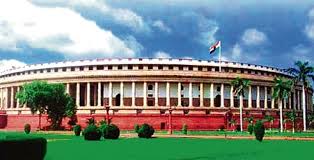The Union Cabinet will introduce the Women’s Reservation Bill in the Lok Sabha this afternoon during the Special Session of Parliament at the new Parliament Building.
It has been learnt that Minister of Law and Justice Arjun Ram Meghwal will introduce the Constitution (128th) Amendment Bill 2023 in the lower house today.
Speaking during the Lok Sabha proceedings at the new Parliament Building today, Prime Minister Narendra Modi said the goal of this bill (Nari Shakti Vandan Adhiniyam) was to increase the participation of women in Parliament and State Legislative Assemblies.
Called it a historic moment, the Prime Minister said the Union Cabinet has had a lot of discussion over the Bill for several years.
But finally on Monday, during a Cabinet meeting, the NDA government approved the bill and the same will be introduced today in the Lok Sabha, he added.
Earlier on Monday evening, Union Minister of State for Food Processing Industries and Jal Shakti Prahlad Patel had shared the information on X (formerly Twitter), stating that the Union Cabinet has approved tabling of the women’s reservation bill. However, the Minister deleted the post later.
It has been learnt that the bill to be introduced in both Houses of Parliament today, is a more radical version of the one introduced by the UPA government in 2010.
The previous bill introduced by the UPA sought 33 percent quota for women in the Lok Sabha and state legislatures, with one-third of seats reserved for females belonging to SCs and STs. It was passed in the Rajya Sabha in 2010, but not taken up by the Lok Sabha.
As per sources, the new bill to be introduced by the NDA government was likely to include reservations for the Rajya Sabha and Legislative Councils as well.
It has also been speculated that the 2023 version will include women’s representation for OBC groups under its ambit, while the previous bill only covered the reservation for women belonging to the SC and ST groups.
Parliamentary Affairs Minister Prahlad Joshi had announced last month to hold a Special Session in September, without declaring its agenda. The agenda for the same was announced last week. The tentative schedule of the legislative business mentioned eight bills and the women’s reservation bill was not among them.
The Special Session kickstarted on Monday at the old Parliament Building with a discussion on India’s ‘parliamentary journey’ spanning 75 years, opened by Prime Minister Narendra Modi in the Lok Sabha and Union Minister Piyush Goyal in the Rajya Sabha.
Although there was no mention of the women’s reservation bill on the agenda, several political parties made a strong pitch in support of it.
Bharat Rashtra Samiti (BRS) leader K. Kavitha wrote to 47 political parties, urging them to unite and pass the bill in this Special Session of Parliament.
Some political parties even suggested reintroduction of the bill during an all-party meeting on the eve of the five-day Parliament session that commenced on Monday.
The Modi government responded to the speculations by saying that a decision would be made at a suitable juncture.
The Rajya Sabha had passed the Constitution (One Hundred and Eighth Amendment) Bill, 2008, also referred to as the ‘women’s reservation bill’ in 2010, which sought to reserve one-third of all seats for women in the Lok Sabha and the State Assemblies.
Although the constitutional amendment was passed by the Rajya Sabha in 2010, it lapsed after the dissolution of the Lok Sabha and was not placed before the lower house of Parliament again.
The Supreme Court is seized of a public interest litigation (PIL) petition filed by the National Federation of Indian Women seeking reintroduction of the Constitution (One Hundred and Eighth Amendment) Bill, 2008.
The bill and its objectives, the NFIW has argued, enjoy support from all political parties and the manifestoes of these parties include the promise of passing the women’s reservation bill.
The petitioner has contended that the government cannot be allowed to keep a bill, which has been passed by the Rajya Sabha and enjoys the support of a majority of mainstream political parties, hanging indefinitely on the pretext of further consideration and the need for consensus between political parties.
A Bench headed by Justice Sanjiv Khanna had in August this year questioned the Union government over its reluctance to file a response to this plea. The Apex Court had indicated that it would issue an order during the next hearing, while staying within the bounds of permissible judicial intervention.


